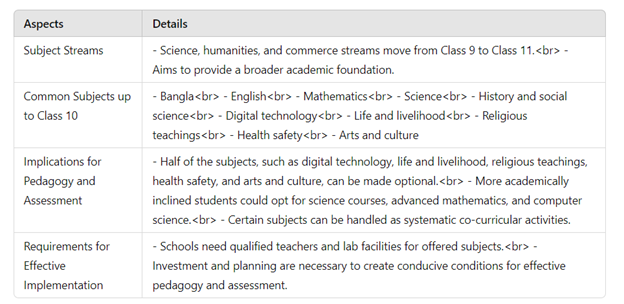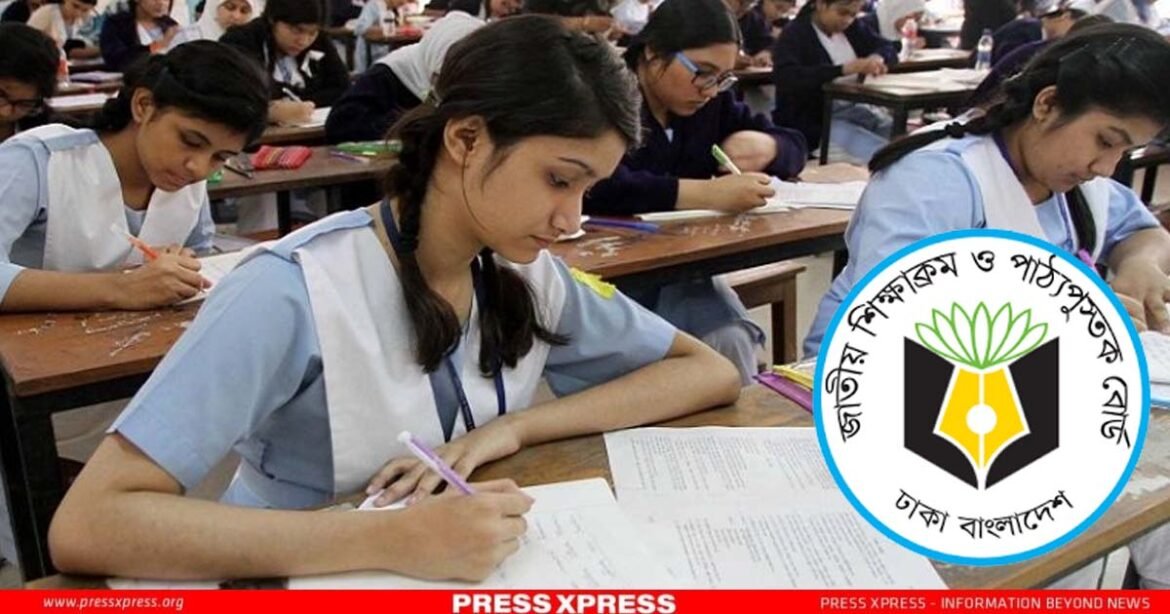- NCTB suggests extensive testing for secondary and higher secondary students
- Includes practical group work (50% of marks) and theoretical written tests
- Concerns arise regarding validity, reliability, and fairness of the new system
The National Curriculum and Textbook Board (NCTB) has proposed a new evaluation method requiring secondary and higher secondary students to undergo extensive testing for each subject. This includes four hours of ‘practical’ group work (comprising 50% of the final marks) and one hour of ‘theoretical’ written test, totaling five hours of testing per subject. Three series of such tests are planned at the end of Classes 10, 11, and 12, with an NCTB-appointed teachers’ pool conducting the practical examinations.
You can also read: Government May Move on Black Money Whitening Scheme

The proposed new evaluation method has ignited significant concerns among parents and educators, who question the curriculum’s potential risks and uncertain outcomes. Criticisms focus on the new system’s validity, reliability, and fairness, especially regarding group-work-based practical tests. As the National Curriculum Outline-2021 rolls out, apprehensions grow about whether schools possess the necessary resources and capabilities to support such ambitious reforms.

Concerns Over the New System
The proposed new evaluation method has raised significant concerns and anxiety among parents and educators about the curriculum implementation process’s potential risks and uncertain outcomes. Several apprehensions surround the new system’s validity, reliability, and fairness. Little is known about the long group-work-based practical tests, raising questions about their stressful nature, fairness, validity, and the examiners’ skills and objectivity. Moreover, there are doubts about whether this approach aligns with reducing high-stakes examination stress for students and effectively measuring essential skills through group work in a public examination setting.
What Actually the Curriculum is!
The National Curriculum Outline-2021, introduced last year (2023), signifies a pivotal educational shift, extending from pre-primary to 12th grade. This progressive curriculum is being phased in gradually, starting with grades 1, 6, and 7 in 2023. It will then expand to include grades 2, 3, 8, and 9 in 2024, followed by grades 4, 5, and 10 in 2025. Subsequent phases will introduce grade 11 in 2026 and culminate with grade 12 in 2027.

Focused on experiential and action-based learning, the new system aims to create a student-centered and enjoyable learning environment. Emphasizing sports and creative activities, it aims to alleviate the burden of traditional subjects and textbooks.
Central to this curriculum is the integration of life and livelihood education, promoting holistic student development. The National Curriculum Outline 2021 represents a significant step towards a more dynamic and engaging educational experience.
The impact and challenges of this new curriculum will become apparent after its first year of implementation, making 2024 a pivotal year for its adoption. Simultaneously, the government is prioritizing comprehensive improvements in the education sector, as reflected in increased funding for the fiscal year 2023-24.
Readiness of Schools
While recognizing the need for curriculum reform, concerns have been raised about whether schools possess the minimum conditions regarding teachers’ capabilities, student-teacher ratio, and the basic learning environment for the proposed ambitious changes. Authorities have assured dramatic changes, with students moving away from rote learning and private tutoring while acquiring practical knowledge. However, these assurances are difficult to trust when over 90% of schools (rural and urban) have not undergone necessary changes, and no plans seem to exist for addressing infrastructural deficiencies. Implementing such changes requires major investments, good planning (short and long-term), and effective execution.
Challenges in Student Assessment
Even in developed nations, student assessment is a complex and challenging area, particularly regarding the validity, reliability, and fairness of measuring what students have learned. Good assessment should indicate how teaching-learning activities have helped students learn and provide feedback on weaknesses and potential remedial measures.
Can Formative and Summative Assessments Be Combined Meaningfully?
- formative (continuous classroom-based assessment by teachers) and
- summative (end-of-year/stage written tests)
Two primary modes of learning assessment are commonly utilized: formative assessment, conducted continuously within the classroom by teachers, and summative assessment, typically administered at the end of a period, such as a year or a stage, often in the form of written tests. Formative assessment focuses on aiding individual student learning, while summative assessment evaluates what students have learned and assesses the performance of the educational institution. While both forms of assessment are valuable and complementary, they serve distinct purposes and employ different methodologies. Therefore, amalgamating these assessments into a single composite result lacks meaningfulness.
The effectiveness of teaching and learning in the classroom is heavily influenced by teachers’ capabilities and skills, as well as by the conditions conducive to good pedagogy, such as manageable class sizes and the availability of appropriate learning materials. These factors determine the outcomes of both formative and summative assessments and their ability to provide valuable insights into student, teacher, and institutional performance. Moreover, there must be sufficient technical capacity and resources for educators, schools, the NCTB, and educational boards to analyze assessment results and implement necessary interventions based on their findings.
In addition to the practical challenges associated with implementing new pedagogical approaches and assessment methods, insufficient attention has been paid to the scientific validity and rationale underlying the proposed system.
Theoretical Considerations
The article highlights that scientific understanding of learning theory suggests students’ intelligence or learning capacity is complex and multi-dimensional, as proposed by Howard Gardner’s theory of multiple intelligences. This implies that learners acquire knowledge in unique ways, and pedagogy cannot be confined to a set pattern. While memorization, critical thinking, reasoning, and practical application all have a role in learning, not everything can be included in a curriculum or assessed.
The sampling and measurement of knowledge and skills require good technical skills, judgment about significant items, and careful test design. Furthermore, the assessment process, tools, and results need regular analysis and refinement to maintain validity, reliability, and fairness.

Curriculum Design and Options
Another aspect of the new curriculum is moving subject streams (science, humanities, and commerce) from Class 9 to Class 11, with ten common subjects for all students up to Class 10. The article suggests that international practices recommend making some subjects optional and allowing academically inclined students to take advanced courses like sciences, advanced mathematics, and computer science. Certain subjects could be better handled as co-curricular activities.
Conclusion
However, for this curricular option to work effectively, schools need qualified teachers and lab facilities for offered subjects, necessitating investment and planning to create conditions for effective pedagogy and student assessment.


